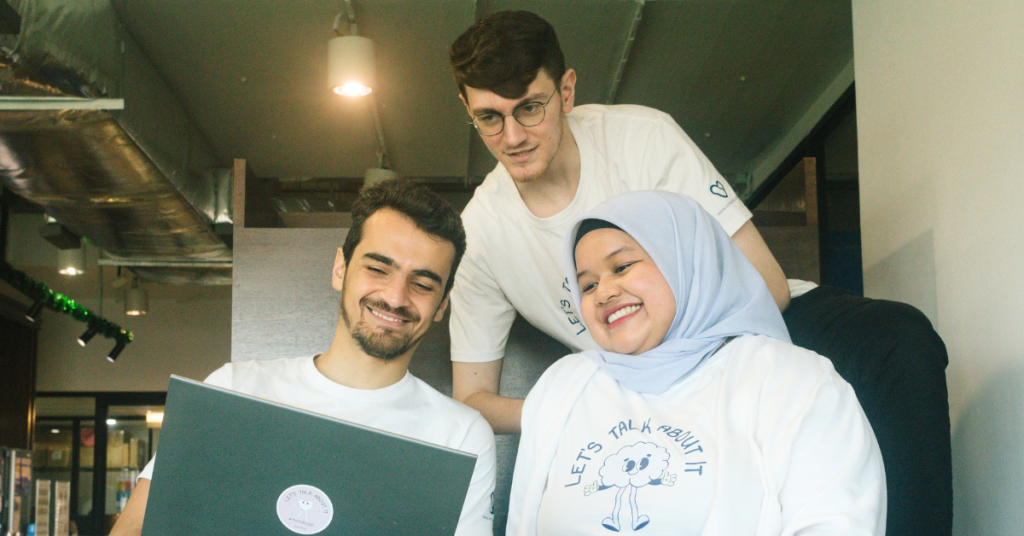When you’re facing a mental health issue, it can be tempting to sweep it under the rug. There are often many other matters in life and work that we may feel have to be prioritised instead.
And if you’re someone that people look up to, like the leader of a company or an entrepreneur making business deals, it can be even more difficult to acknowledge that you need help. After all, time heals… right?
But that’s really not how mental health works, and it’s not the best way to go about it.
So in celebration of Men’s Health Awareness Month, we spoke to three Malaysian male entrepreneurs to understand their personal struggles with mental health and how they’ve been dealing with it. They are:
- Chor Chee Hoe, co-founder and CEO of Qarbotech, an agritech brand offering products to shorten the crop cycle and increase plant growth
- Shavkat Aslamshoev, co-founder and Managing Director of SafeTalk, a cloud-based Practice Management System for mental healthcare providers
- Timothy Tiah, founder and Executive Director of Colony Coworking Space (Colony), a brand of hospitality-inspired coworking and event spaces
A look back on their personal mental health journey
For most people (myself included), I find that when faced with major life-altering news, we’ll go through the five stages of grief, starting with denial. This was what all three entrepreneurs felt when they were first confronted with the possibility of having a mental health issue.
For Chee Hoe, it was in the form of significant stress that badly affected his sleeping pattern. At the time (October 2022), his startup had less than three months of runway left. As leader of the company, he was understandably distressed.
“I woke up every night [around] 1:30AM to 5AM to work, mainly looking for revenue generation opportunities and potential investors,” he confided.
And yet, he didn’t find this out of the ordinary or troubling until his wife pointed it out. Only then did he realise that it was a symptom of anxiety.

Not-so-fun fact: Stress can cause sleep deprivation. Frequently being in a heightened state of alertness can delay the onset of sleep and causes rapid, anxious thoughts to occur at night. The lack of sufficient sleep from this can then cause further stress.
Medical News Today
In Timothy’s case, he wouldn’t believe that he had depression and anxiety even after his diagnosis.
“You know, we use the word ‘depression’ very lightly. Like ‘Oh I feel very depressed’, so I was wondering what’s the big deal?” Timothy shared.
A pivotal moment in him realising he had these struggles was during a conversation with his wife. He told her, “It’s not that I’m depressed. I don’t feel sad, I can’t feel joy. And then she said, ‘That’s depression.’”
For Shavkat, his mental health struggles came in the form of sleep paralysis episodes.
Not-so-fun fact: Sleep paralysis is a condition where you briefly lose muscle control after falling asleep or before waking up. During these episodes, people often experience hallucinations and a sensation of suffocation.
Sleep Foundation
“I found myself struggling, feeling like I couldn’t breathe properly during my sleep. During those times, each night became a struggle. The sensation of suffocation was intense and frightening,” Shavkat explained.
“I felt restless all the time. Imagine needing sleep but being scared to fall asleep because you know it will be a nightmare again. This constant unease affected my personal and work life.”
But talking about mental health wasn’t common in his hometown of Tajikistan, and that stuck with him even after moving to Malaysia.
So how exactly did they go about it and what learnings did they pick up?
1. You can’t bottle it up and expect to get better
To quote Chee Hoe, “Mental health issues are like fire. If you keep it under wraps, it will burn like an explosive flame in the future.”
In other words, the longer you keep the issue to yourself, the more catastrophic it will be for you in the long run. Which is why he recommends finding an outlet to express your mental health struggles.
“They may not [be able to] offer you any solutions, but they are there to hear you out,” he shared.

In Timothy’s case, depression in itself is a difficult struggle to go through by yourself. “It’s a lonely mental illness. It convinces you that you’re all alone, not worth it, and that nobody wants to help you,” he explained. So having people around him to refute that was very important.
As for Shavkat, his recurring sleep paralysis episodes made simple things hard. “I lost joy in things I used to enjoy. Making decisions felt tough, and it became challenging to connect with people.” It was only after getting help that he got back a sense of normalcy and control over his life again.
2. Don’t limit your support to just family and friends
Although he credits his wife and close friends for their support, Chee Hoe also suggested looking for external support. If you’re struggling in your career, then a good business mentor or coach could guide you.

Similarly, Timothy and Shavkat explained that seeking professional help was paramount to their mental health journey. The founder of SafeTalk shared that aside from his friends, his therapy sessions were another safe space and emphasised on finding your own.
“If existing circles prove unsupportive and online communities aren’t accessible, seeking professional help is paramount. Trained professionals possess the expertise to navigate mental health struggles, and there are often affordable or even free mental health support services available.”
“It’s very hard but you should see a professional. If you don’t feel good about the one you found then find another. You’ve got to find one that fits you,” Timothy advised.
Whichever avenue you choose, it’s important to find a channel where you can safely express your feelings.
3. It doesn’t necessarily hinder you from growing as an entrepreneur
In their own ways, personally experiencing mental health struggles made the entrepreneurs wiser businessmen.

For example, Timothy shared that it helped him become a more empathetic and compassionate leader. This is reflected in Colony’s company culture, where employees who aren’t feeling mentally well are entitled to paid leave.
“I believe that when you know how to deal with people struggling with mental health, it becomes a competitive edge to attract talent,” Timothy explained. “It’s anecdotal, I can’t prove it in numbers. But I do think it’s important.”
Similarly, Shavkat made sure to integrate mental health days into SafeTalk’s employee benefits.
“We understand that everyone faces tough times and taking a break is crucial,” he said. “It’s not just a business, it’s a community that genuinely cares about the well-being of its team.”
In Qarbotech’s case, while there are no structured workplace benefits related to mental health, Chee Hoe shared that employees can submit claims for therapy sessions.
4. Being open about it could actually help your career
A key reason people avoid sharing their mental health struggles is the belief that this would be met with backlash, especially in the workplace.
You might be worried about what coworkers think of you or how it could impact your career progression. As an entrepreneur, you might wonder if it burns business opportunities.

However, Timothy and Shavkat found that it actually had the opposite effect for them.
The Colony CEO shared that quite a number of entrepreneurs have privately confided in him with their own mental health struggles.
Similarly, Shavkat explained, “By being open, I’ve found common ground with others who have faced mental health challenges. This shared vulnerability has actually made my business interactions more genuine and understanding, contributing to a supportive and empathetic business environment.”
5. Talking about mental health is not a sign of weakness
A common stigma is that having mental health issues equates to you being weak. It can hinder people from looking for help and treatment. But this belief is far from the truth.
In fact, opening up about your mental health struggles actually shows the strength you have. Although, this doesn’t mean that keeping it to yourself makes you weak, either.
You shouldn’t feel obliged to share your mental health struggles, but when you feel ready and safe to do so, it can be helpful in ways you don’t expect.
Supporting this, Shavkat said, “It takes courage to be vulnerable, and it indicates a level of trust in the work environment.”
By talking about it in the workplace, it fosters a space where mutual support is the norm. “Especially when mental health struggles impact our daily routines,” he explained.

This approach allows coworkers to be understanding of your condition, and potentially plan work engagements around that. For example, if you’re only able to see your therapist on weekdays, opening up to colleagues about this could help with your appointments.
6. The only way around the stigma is to talk about it
Chee Hoe and Shavkat believe that before we can talk about overcoming mental health struggles, we first need to talk about it.
“I think it’s important to have joint community efforts to create awareness about symptoms of stress, fatigue, and mental well-being,” Chee Hoe said. “When the general public is more aware about mental health, I think the stigma will be reduced.”
Elaborating on this, Shavkat believes that sharing experiences creates a domino effect. “When one person in a community opens up about their mental health struggle, it often serves as a catalyst for others.”
This is because speaking openly about mental health struggles creates an inviting space for others, where they can realise that they’re not the only ones feeling a certain way.
7. Your mental health struggles don’t have to define you

At the end of day, one important point that Timothy brought up was that you don’t have to let your mental health struggles become your identity.
“If you’ve noticed, I don’t talk much about it, and I think most people with depression don’t want to talk about it so much. Because they don’t want it to become a daily reminder that you have it. They want to move on from it,” he expressed.
In that light, you can choose to move beyond that box and act accordingly.
Yes, you’re struggling with mental health issues, but that doesn’t have to become your whole personality. You can find ways to work around your condition so that it can allow you to grow into a better version of yourself.
Think of it like any other illness in the world. If you’re having a headache, it doesn’t mean you are yourself a headache. It just means that you’re going through certain symptoms.
- Read articles we’ve written about Malaysian startups here.
Featured Image Credit: Qarbotech / SafeTalk / Colony











